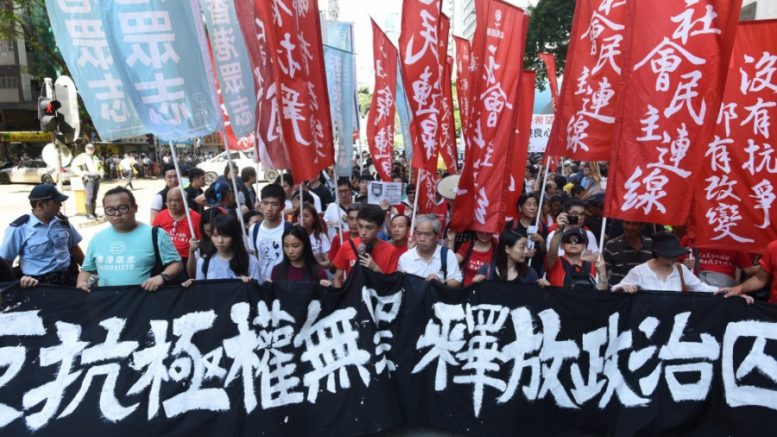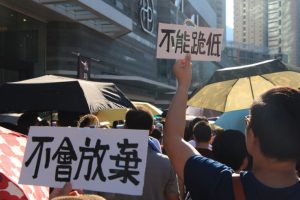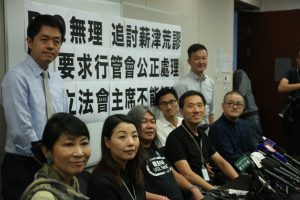By Chris Yeung –
The people are angry. Tens of thousands of protesters have braved torching heat in the biggest rally since the Umbrella Movement to vent out their fury over the sentencing of three student leaders in the 2014 protests. And they have vowed not to resign to the fate of doom and futility in their fight for democracy under communist Chinese rule.
The city’s democratic movement might have slid to a low point 33 months after the 79-day civil disobedience protests ended in failure. That the angry Hongkongers came out again on Sunday has lifted up the mood of the pro-democracy camp and their supporters in the society.
The jailing of Joshua Wong Chi-fung, Nathan Law Kwun-chung and Alex Chow Yong-kang on Thursday will be remembered as a watershed in the city’s history in some important aspects.
The trio has been widely seen as the city’s first batch of political prisoners, or prisoners of conscience, after it reverted to Chinese sovereignty in 1997.
Also importantly, it appears to have emerged as a spark that has reignited the fire of anguish, frustration and anxiety among people across different segments of the society.
It is not difficult to understand why the Court of Appeal’s ruling in favour of a government appeal for heavier punishment against the trio on Thursday has whipped up a public outcry. They are young. Although they had breached the law and their actions were deemed radical, they had caused no serious injuries to other people. To many people, they have a case for leniency.
Legally okay though it is, the Government’s decision to seek to overturn the original court decision to impose community services orders and suspended imprisonment has been seen as a case of political prosecution against dissent.
If the original court ruling has been seen as too lenient, the Appeal Court’s decision to send the trio to six to eight months in jail has been too harsh. Not just the pan-democrats found it difficult to accept, ordinary people have become sympathetic to the student leaders and sceptical towards the government-initiated judicial review.
Thursday’s jailing of the trio has aggravated the feel-bad sentiments of the pan-democratic segment of the society that has prevailed and deepened in recent years.
Cases unfavourable to the pan-dems
It came hot in the heels of a government victory in their judicial review against a court decision on the sentencing of 13 land activists over their protest against a Legislative Council’s decision on a financing plan for northeast New Territories development in 2014.
Clock turned further backwards. Following Youngspiration’s Sixtus Leung Chung-hang and Yau Wai-ching, four more elected pan-democrat lawmakers lost their seats after they were disqualified in a court ruling on the legality of their oath-taking.
To add insult to injury, at least two of them had been ordered to return the allowances they received and they money they spent on their offices to the Government. The other four are likely to face the same order with a bigger bill estimated at millions of dollars. They face bankruptcy if they fail to pay the money back. And if they go bankrupt, they will not be qualified to run for Legco elections again.
The flurry of government salvos against pan-democrats in the aftermath of the Occupy Central movement should not come as a surprise to them and their supporters. But taken together, they have inflicted wounds in the relationship between the pan-democrats and the Government and in the overall mainland-Hong Kong relations.
True, the decision of Leung Chun-ying not to seek another term has marked cooled down the political temperature. The overall political atmosphere has become moderate since Carrie Lam Cheng Yuet-ngor took office on July 1, but only on its surface.
Political strain is growing and may turn into fresh frictions in the wake of the string of disqualification of pan-democrat lawmakers and jailing of pro-democracy activists and political figures.
They will become fresh sparks that may set ablaze the political scene already laden with highly inflammable issues such as the joint checkpoints arrangements, political reform and Basic Law Article 23.
Eagerly keen to put highly-contentious issues including political reform and Article 23 low on her political agenda, Mrs Lam is hoping to moderate the socio-political atmosphere by seeking early results on economic and livelihood issues.
Sunday’s protest should give a warning to her and Beijing about the potent force of people’s aspiration for democracy and opposition against the government’s quell of political dissent.
Chris Yeung, Chief Writer of newly-launched CitizenNews, is founder and editor of the Voice of Hong Kong website. He is a veteran journalist formerly worked with the South China Morning Post and the Hong Kong Economic Journal. He writes on Greater China issues.
Photo: CitizenNews pictures
This article also appears on CitizenNews website.




Be the first to comment on "Protesters’ return a warning to Govt"